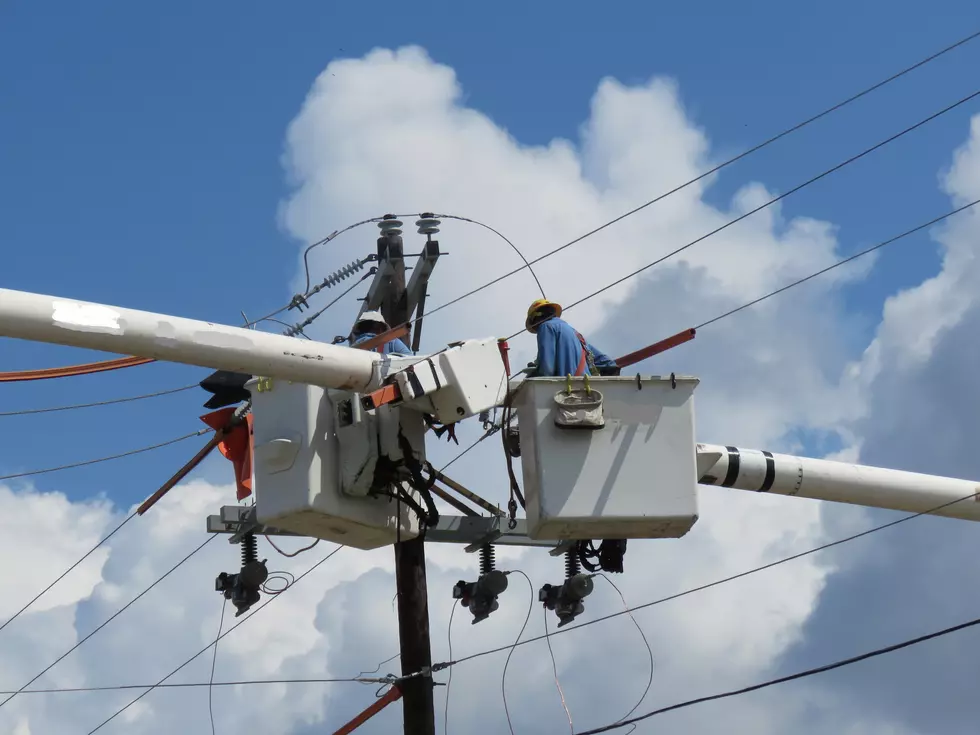![NJ Utility Companies Could Face Steep Fines for Power Delays [AUDIO]](http://townsquare.media/site/385/files/2012/07/UtilityCrew.jpg?w=980&q=75)
NJ Utility Companies Could Face Steep Fines for Power Delays [AUDIO]
Last year, New Jersey was hammered by Hurricane Irene, Tropical Storm Lee and a freak October ice storm that caused widespread and prolonged power outages throughout the state. The Board of Public Utilities (BPU) held several hearings to find out what problems needed to be addressed in order to avoid a repeat of the hardships caused by those devastating storms. Yesterday, Governor Chris Christie announced he's proposing legislation that holds public utility companies responsible for their performance during natural disasters, including significant financial penalties.
"The storms of 2011 posed serious, unprecedented challenges for our utility providers, infrastructure, and families and businesses who depend on their electricity service," explains Christie. "While those storms brought out the courage and professionalism of public utility employees from inside and outside of our state, they also exposed the vulnerabilities of our utility infrastructure and avoidable mistakes."
REPORT: BPU Report
The legislation establishes civil administrative penalties up to $25,000 per violation (up from a $100 daily assessment), with a maximum $2 million civil penalty for any related series of events. Public utilities would be barred from passing on the cost of penalties to ratepayers. This initiative stems from state Board of Public Utilities' recommendations related to Hurricane Irene and the October 2011 snowstorm, which caused extensive, sustained power outages across the state.
Republican State Senators Joe Pennacchio and Kevin O'Toole say they will sponsor and submit the Governor's Reliability, Preparedness and Storm Response Act of 2012.
"This strict accountability measure protects the public from the dangers and hardships caused by deficiencies in New Jersey's public utility infrastructure and utility communication protocols, which were exposed by last year's storms," says Pennacchio. "We need to hold utility companies to the fire to assure they do everything possible in preparation for future weather emergencies."
O'Toole explains, "We must mandate better service for ratepayers, who pay enough for what has to be safe, reliable and expeditious utility services. This Act is a long time coming and warrants swift action by our legislature."
In a written statement, Jersey Central Power & Light (JCP&L) says it, "is reviewing the recommendations in the Board of Public Utilities' (BPU) storm report, will continue to cooperate with the BPU, and is committed to exploring opportunities that will improve service and reliability for our customers. As has been well documented, JCP&L has made many improvements in how we respond to major storms following Hurricane Irene and the October snowstorm. Since last August, JCP&L added line crews and operations managers, invested $200 million in the reliability of the distribution and transmission system, and adopted new procedures and technology. The company also is providing more frequent and better information to local officials and customers before and during outages. We will continue to work to provide the kind of reliable electric service our 1 million JCP&L customers expect and deserve."
Under Christie's proposed legislation, civil administrative penalties will be changed from a maximum daily assessment of $100 under current law to $25,000, with a maximum of $2 million in penalties for any series of violations related to a particular event. Public utilities would be barred from passing on the cost of these penalties to ratepayers.
The legislation also prioritizes the importance of preparedness and reliability standards in responding to emergencies that threaten service delivery, by putting in place aggressive planning requirements for public utilities for service reliability and strategic communications in an emergency in the form of an annually submitted plan, as well as requiring the Board of Public Utilities (BPU) to develop and enforce performance benchmarks for service reliability, service disruption preparedness, service restoration, and communications for electric distribution companies doing business in the State.
The proposal also grants BPU investigative authority to review public utility performance during an outage and, if found to be failing in implementing its reliability plan, impose civil administrative penalties.
"Many lessons were learned from last year's storms and the hardship they created for our residents and businesses," says GOP Assemblyman Anthony Bucco. "The outcome of those hearings was not only meant to give aggravated residents an opportunity to vent their frustrations. The feedback and suggestions were intended to improve the flow of communication and to ensure every effort is being made to restore power to people across the state in a timely manner."
Republican Assemblywoman Donna Simon says, "Even during extreme weather conditions, electric companies must improve their response to power outages. People should not be left in their cold, dark homes with misleading information about when their power will be restored."
Assembly Telecommunications and Utilities Chairman Upendra Chivukula, a Democrat welcomes Christie's interest in holding utility companies accountable for restoring service after outages. Chivukula also notes the Governor's plan is similar to legislation he's already introduced.
"Extended service outages have long plagued New Jersey consumers, and I'm pleased to see Governor Christie and his administration join us in this discussion," explains Chivukula. "I look forward to reviewing what Governor Christie has proposed and seeing how it fits with legislation I have already sponsored and determining what's best for consumers. Hopefully everyone is willing to work together to reach a positive result that protects consumers."
"The storms our state encountered last year served as a wake-up call to the utility companies that their emergency response plans needed to be reviewed and updated," says Republican Assemblywoman Amy Handlin. "But these revised plans, that minimize the impact on residents and businesses that need the basic necessities of power and water restored as quickly as possible, must be put into action. It is entirely appropriate for companies to face significant consequences if they fail to learn from their recent experiences."
More From New Jersey 101.5 FM









